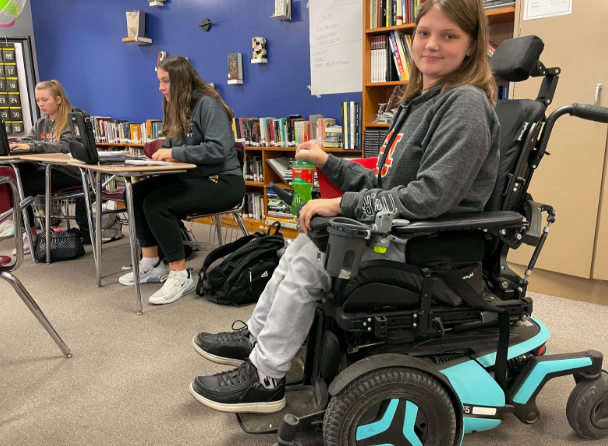An Inside Look on Krabbe Disease
January 24, 2023
This story features a Q&A with Zoey Moore, an AHS student with Krabbe Disease.
What is Krabbe Disease?
The definition of Krabbe Disease according to the National Institute of Neurological Disorders and Stroke is “a deficiency of galactocerebrosidase, an essential enzyme for myelin metabolism.” It most commonly affects infants but can occur later in one’s life. Approximately 40 babies are diagnosed with this rare condition each year in the United States, and it affects one to 100,000 individuals in this country alone. The mortality rate is as high as 90% in the first two years of life. The late-onset type has a better prognosis, and life expectancy is five to seven years after the onset of symptoms. Krabbe disease is inherited, which means it is passed down through families.
Does anyone else in your family have Krabbe’s?
No one has Krabbe’s Disease in my family, but my mom’s first kid was Raegan, my sister, who had Krabbes and she passed away when she was 19 months old. It took many doctors to figure out what she had, a missing enzyme that causes Krabbe.
What are your daily struggles?
It takes me longer to get ready in the morning and it takes me a while to get to my classes. Now that I’m getting older my muscles are getting tighter. I think it will get easier to get dressed and get to classes on time.
I couldn’t move around that well before I had surgery because I would walk for a bit and then I would have to sit for a long time until I could walk. Now that I had the surgery, I can walk and stand for a long time. I still have to sit sometimes but it’s not as bad as before surgery. One hardship that I have to face and others don’t is if a door is closed I have to ask someone to open the door for me.
When did you get Krabbe Disease and is it permanent?
I was born with Krabbe and when I was 18 days old, I began 10 days of intensive chemotherapy. Then when I turned 28 days old, I had a cord blood transplant. I had been in the hospital for 40 days after the chemo because I couldn’t fight any infections until my immune system started to build up. The transplant replaced the enzyme I was missing, but any damage prior to the treatment would stay there. It hurts a little bit when I get scratched because I’m so tight in my hips and it takes me a long time to get dressed because I have to put on my shoes and braces. Others don’t treat me differently because I have Krabbe, they treat me like how other people are.
Krabbe is a lifelong thing. My walking can improve but I’ll still have Krabbe. Having surgery was good for me because of physical therapy. I can stand without holding on to anything. I always find a way to do what I need to do.
**story corrected on 1/24/23
